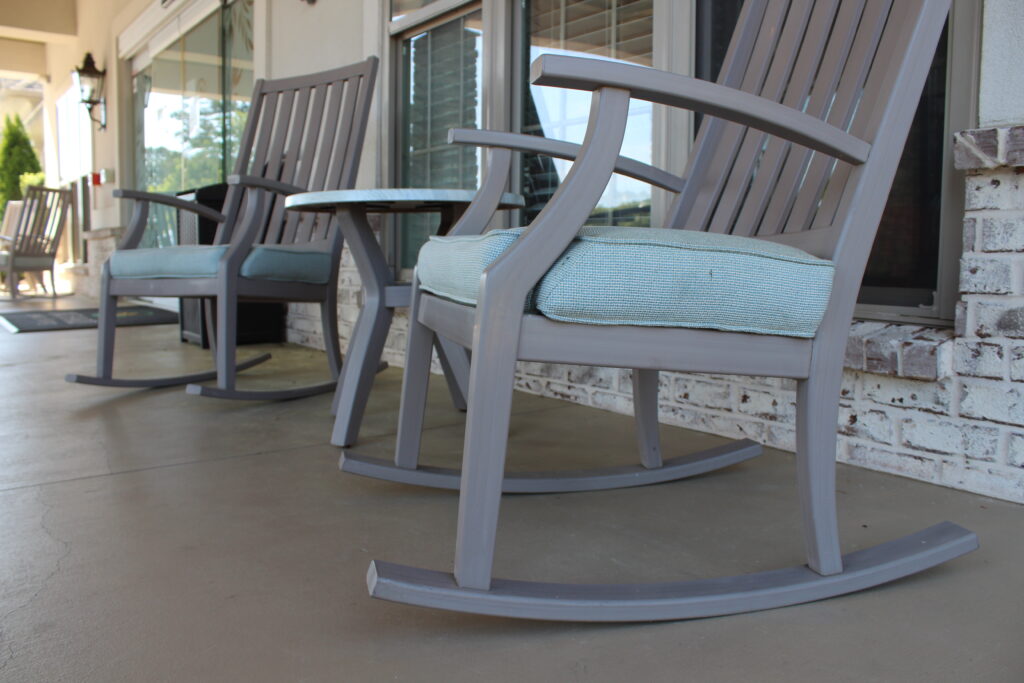
Rocking chairs line the outside of the Orchard at Athens’s main building. (Photo/Ellie Shafer)
An older couple decides it’s time to look for a nursing home. Scouring the different facilities, levels of care, various amenities and more – they land on sharing a semi-private room – a whopping median price of $6,935 per month in Athens in 2021, according to Genworth.
Eventually, one partner needs more care than the other, so they split up, still living in the same community. Now, the couple pays two room rates – not necessarily what they sought to do but if lucky enough, warned about by their financial advisors.
This is a reality for some nursing home residents, said Kendall Brown, community relations director at the Orchard at Athens.
“That is a situation that’s really tricky because you know that someone needs to have more support, but financially, that just doesn’t make any sense for somebody,” Brown said.
“…[The Orchard at Athens] likes to be upfront with that just because it can happen, but that’s probably one issue that I would say I see. And I see it everywhere.”
While this scenario is one of many, navigating the ins and outs of long-term care has proven to be difficult, and in a sea of payment options and rising demand from the increase in the 65+ population – the equation becomes even more complicated.
The Money
In 2022, the median income in an Athens household was $47,798, according to the U.S. Census Bureau. Meanwhile, in 2021, the median price per year of an assisted living facility in Athens was $50,202 per year, and the cost of a semi-private room in a nursing home was $83,220 per year.
Costs are only expected to go up, with the average inflation rate in 2023 being 4.1%.
Only 18% of Americans 65 and older were in the labor force as of 2020, according to the Administration for Community Living, which leaves the burden to pay for long-term care on life savings and assets, the families of the resident, retirement funds, insurance policies, pensions and more.
While the potential list of benefits available to potential long-term care residents can seem long, these resources can be hard to find and inaccessible to the general population.
One example is Medicare, which provides healthcare assistance to those who qualify primarily ages 65 and older. Medicare does not cover most assisted living costs, according to the National Council on Aging. Medicare will, however, cover the full cost of 20 days in a skilled nursing home, part of the remaining 80 and then none after day 100.
Medicaid, on the other hand, can cover some of the costs for lower-income residents who meet certain criteria and is currently the largest payer of long-term care. Though, not all nursing homes accept Medicaid.
Long-term care residents also rely on the support of family members and selling their current assets, including their homes and cars.
The Demand
In addition to inflation, another contributing factor to the increase in long-term care costs is demand. The baby boomer generation, the largest of any current generation, is aging, which means about 10,000 citizens are turning 65 each day until 2030.
“The problem is that we don’t have the workforce or the facilities to take care of all the people that are going to need to be taken care of because of the baby boomer generation who’s now aging,” said Dr. Don Scott, director of education in geriatric medicine for the AU/UGA Medical Partnership and the IM residency program at St. Mary’s Hospital.
In Athens, 11.5% of the population is 65 or older, according to the U.S. Census Bureau, which is expected to increase.
When asking Brown about the changes in demand at the Orchard at Athens, she said there was an increased number of patients with memory care needs instead of assisted living.
“The fastest growing demographic group in the United States are people 85 and over. And the rates of disability and dementia and people that are 85 and over are obviously the highest of any segment of our population,” Scott said.
“So yeah, we’re not prepared, and it’s going to be an increasing, increasing problem. And it’s going to fall as it already does on the backs of families.”
